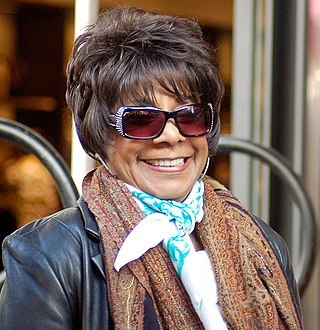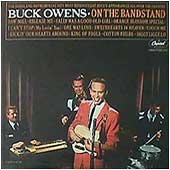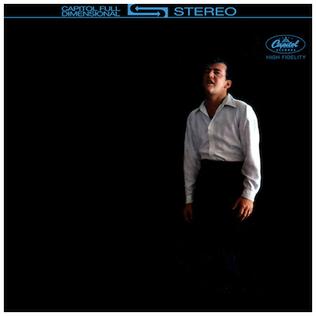
Same Train, A Different Time is the ninth studio album by American country music artist Merle Haggard backed by The Strangers, released in 1969, featuring covers of songs by legendary country music songwriter Jimmie Rodgers. It was originally released as a 2 LP set on Capitol (SWBB-223).

Highways & Honky Tonks is the fourth album by Heather Myles, and the first with her new record company Rounder Records. There is a cover of the old Charley Pride song "Kiss an Angel Good Morning," and Merle Haggard drops in for a guest appearance on the duet "No One Is Gonna Love You Better." Myles wrote ten of the twelve songs herself.
"If I Were a Carpenter" is a folk song written by Tim Hardin in the 1960s, and re-recorded with commercial success by various artists including Bobby Darin, The Four Tops and Johnny Cash. Hardin's own recording of the piece appeared on his 1967 album Tim Hardin 2. It was one of two songs from that release performed by Hardin at Woodstock in 1969. The song, believed by some to be about male romantic insecurity, is rumored to have been inspired by his love for actress Susan Morss, as well as the construction of Hardin's recording studio.

Merry Clayton is an American soul and gospel singer. She provided a number of backing vocal tracks for major performing artists in the 1960s, most notably on the Rolling Stones song "Gimme Shelter". Clayton is prominently featured in 20 Feet from Stardom, the Oscar-winning documentary about background singers and their contributions to the music industry.

Waylon Live is a live album by Waylon Jennings, released on RCA Victor in 1976.
"Detroit City" is a song written by Danny Dill and Mel Tillis, made famous by Billy Grammer, country music singer Bobby Bare and Tom Jones. Bare's version was released in 1963. The song — sometimes known as "I Wanna Go Home" — was Bare's first Top 10 hit on the Billboard Hot Country Singles chart that summer, and became a country music standard.

The Everly Brothers Sing Great Country Hits is an album by the Everly Brothers, originally released in 1963. It was re-released on CD in 2005 on the Collectors' Choice Music label.

"Things" is a song which was written and recorded by Bobby Darin in 1962. Released as a single, it reached No.3 in the U.S.and Canada, No.2 in the U.K., and No.3 in the first-ever official Irish Singles Chart, published by RTÉ in October 1962. It was later covered by Ronnie Dove and became a Top 30 country hit for him.

On the Bandstand is an album by American country music artist Buck Owens, released in 1963. It peaked at Number 2 on the Billboard Country Albums charts.

If I Were a Carpenter is an album by American singer Bobby Darin, released in 1966. It was a significant change in direction for Darin considering his previous album was a collection of show tunes.

Sunshine in the Shadows: Their Complete Victor Recordings (1931–1932) is a compilation of recordings made by American country music group the Carter Family, released in 1996. It is the fifth of nine compilations released by Rounder Records of the group's Victor recordings. The original Carter Family group consisting of Alvin Pleasant "A.P." Delaney Carter, his wife Sara Dougherty Carter, and his sister-in-law Maybelle Addington Carter recorded many of what would become their signature songs for Victor Records.

Here's the Answer is the second studio album by American country artist Skeeter Davis. The album was released in January 1961 on RCA Victor Records and was produced by Chet Atkins. The album consisted of cover versions of hit singles by country artists and answer songs to the hits.

Brenda, That's All is the seventh studio album by American singer Brenda Lee. The album was released October 15, 1962 on Decca Records and was produced by Owen Bradley. It was the second of two studio albums released in 1962 and included two Top 10 hit singles on the Billboard Hot 100 between 1962 and 1963.

..."Let Me Sing" is the ninth studio album by American singer Brenda Lee. The album was released December 9, 1963, on Decca Records and was produced by Owen Bradley. The album was the second and final album studio album released by Brenda Lee in 1963.
"It Keeps Right On a-Hurtin'" is a song written and recorded by Johnny Tillotson, which was a major hit for him in 1962. It has been recorded by many other artists.

Lesley Gore Sings of Mixed-Up Hearts, also known as Sings of Mixed-Up Hearts, is the second studio album by Lesley Gore. It was released in 1963 as the follow-up to her debut album I'll Cry If I Want To.

18 Yellow Roses is an album by American singer Bobby Darin, released in 1963.

Earthy! is an album of folk songs by American singer Bobby Darin, released in 1963, and arranged by Walter Raim. The album was reissued on CD in 2002 with Darin's release Golden Folk Hits.
Price Mitchell is an American country music singer. He had six songs that made it onto the national country music charts in the 1970s and one album that charted. He recorded on Prize Records in 1971. He also released 45s and albums with GRT Records and then on Sunbird Records as well as on Sunset Records. His hits included "Personality" that reached #29 in April-May 1975. It was cover of the 1959 Lloyd Price Pop/R&B hit. Mitchell's duet with Jerri Kelly "I Can't Help Myself " reached #65 in Jan-Feb 1975, a cover of the 1965 Pop/R&B The Four Tops hit.
"The Lady Came from Baltimore" is a song written by American singer-songwriter Tim Hardin, who recorded and released it as a track on his album Tim Hardin 2 in 1967. The song was inspired by Hardin's relationship with his wife, Susan Yardley Morss, who acted under the name Susan Yardley and who came from a prosperous family in Baltimore who disapproved of the relationship; Hardin's lyrics refer to "Susan Moore".















